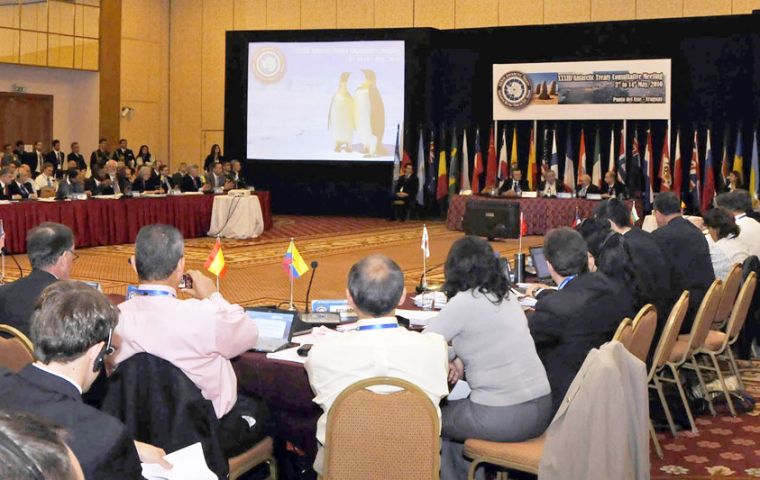MercoPress. South Atlantic News Agency
Antarctic Treaty Governments Progress on Climate Change and Marine Protected
 Areas: Fail on Biological Prospecting, Polar Code and Tourism
Areas: Fail on Biological Prospecting, Polar Code and Tourism Punta del Este, Uruguay. Antarctic and Southern Ocean Coalition welcomed steps at the 33rd Antarctic Treaty meeting to make climate change a major item on the agenda, and to keep momentum going on a network of Marine Protected Areas in the Southern Ocean.
The governments endorsed thirty recommendations produced at a meeting of Antarctic climate experts held in Norway in April, and a Scientific Committee on Antarctic Research (SCAR) report on Antarctic Climate Change and the Environment, a synthesis of the latest climate science from Antarctica. They agreed to formally forward the report to the United Nations Framework Convention on Climate Change (UNFCCC) for use in the global negotiations. Climate change will be a major work item at the Antarctic Treaty meeting next year.
“We welcome these important steps,” said Tina Tin, Antarctic and Southern Ocean Coalition (ASOC) climate campaigner. “Climate research in Antarctica provides crucial information for the international community as it decides how to avoid dangerous climate change. The governments have started to take significant steps to lower the carbon footprint of their Antarctic research stations and logistics, but there is much more that can be done.”
The governments endorsed development of a comprehensive and representative network of marine protected areas in the Southern Ocean, including the Ross Sea, by 2012. The importance of protecting the Ross Sea region was particularly highlighted in terms of its biodiversity and function as a climate change reference area and ecological refuge for many Southern Ocean species.
“Now that CCAMLR (Commission for the Conservation of Antarctic Marine Living Resources) has designated the South Orkneys MPA, the Antarctic Treaty System must now ensure that marine protection measures are harmonized without duplicating effort,” said Rob Nicoll of WWF. “To achieve the 2012 target we need to see the Antarctic Treaty Parties working closely with CCAMLR including introducing new MPA proposals and bodies of work to enhance Southern Ocean Protection,“ added Sam Leiva of Greenpeace Chile.
ASOC criticized the failure of the governments to take any action on biological prospecting. SCAR introduced a report on the burgeoning biological prospecting taking place in Antarctica and the Southern Ocean, which is going on with no oversight or control. ”The governments are not complying with its 2005 Resolution requiring Parties to share all information about their own bioprospecting and patenting of Antarctic life forms,“ said Jim Barnes, ASOC Executive Director. ”It is shocking that they couldn't even agree to continue intersessional work to prepare a regulatory framework for this rapidly emerging industry.”
Another missed opportunity was development of the Polar Shipping Code. This is under negotiation at the International Maritime Organization (IMO). “The Antarctic Treaty Parties have failed to provide any concrete detail about the substance of the Code, which we hope will set higher standards for all vessels operating in the Arctic and Antarctic,” said Sian Prior, ASOC's IMO representative.
The meeting also discussed Antarctic tourism. Rapid growth over the past decade has resulted in greater diversification of the industry and increasing use of large vessels carrying up to 3000 passengers, which are not built to sail in Antarctic waters, and new forms of land-based tourism. The industry has been affected by several recent incidents, including the sinking of the MS Explorer in November 2007. However, rather than taking action on the most pressing issues, the ATCM focused its attention primarily on yachts, a growing but small number of which visit the region each year.
More info: www.atcm2010.gub.uy



Top Comments
Disclaimer & comment rulesCommenting for this story is now closed.
If you have a Facebook account, become a fan and comment on our Facebook Page!